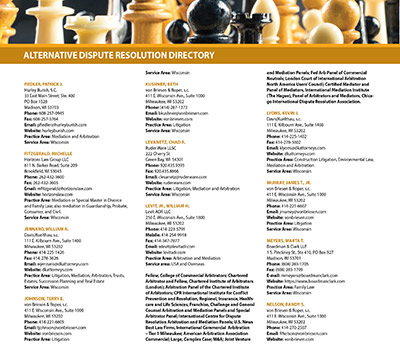BE CANDID! Being forthcoming in mediation submissions eases way to resolution
By: Bridgetower Media Newswires//November 26, 2019//
BE CANDID! Being forthcoming in mediation submissions eases way to resolution
By: Bridgetower Media Newswires//November 26, 2019//
By Patrick Fiedler

It’s common knowledge that almost all civil cases are resolved before trial. Sometimes, lawyers and parties are able to reach a resolution by direct negotiation. Often, it is necessary to use a mediator. Thus, the importance of an excellent mediation submission is crucial.
The subject matter to be take up in a submission will necessarily vary depending on the nature of a case—whether it concerns personal injury, business disputes, insurance disputes, employment matters, etc. In almost every case, the following sections will be relevant and should be in your submission:
- Statement of Facts
- Issues and Theories of Liability
- Damages
- Settlement Negotiations
- Conclusion
Statement of facts—This should be a chronological narrative of all facts relevant to the case. Prepare this section as you would your opening statement in a trial. What do you want the jury (or mediator) to concentrate on? Keep in mind that the length of the statement is not a predictor of the outcome of either a trial or a mediation. Concentrate on what is important.
Issues and theories of liability—How many different viable causes of action are there? What are the elements of each claim that a claimant must prove? (Hint – Reference the applicable jury instructions.) What are the defenses to each claim? Who has the burden of proof, what is it, and does it shift?
Damages—Envision a special verdict. What are the separate categories of damages? Your damages should be itemized. Documents establishing all special damages should have been provided to opposing counsel before mediation. In a PI case, how old is your client and what is his or her life expectancy? Are you seeking actual attorney fees and costs? If so, what is your legal basis—contractual, statutory, administrative code?
Settlement negotiations—All negotiations before mediation should be included in your submission. Necessary information includes the date on which an offer or a counter-offer was made, who made it, how much was offered, whether it included any non-monetary items, etc. Oftentimes, previous settlement discussions set the ceiling and the floor for the beginning of mediation itself.
Conclusion—Again, the length of this section does not necessarily correspond to the outcome of mediation. Include any information that will help a mediator get a case resolved. One of the best submissions that I’ve received contained the statement, “The biggest impediment to reaching a resolution will not be the plaintiff but the plaintiff’s wife.” Knowing that ahead of time was very helpful in getting the case settled. Also, will anyone else besides the parties be present at mediation? If so, who are they and what is their role? Examples include a spouse or a friend that the party relies upon. Use this section to give the mediator a “lay of the land” relating to the personalities involved. Also, how did this case get to mediation? Was it ordered by the court? Or was it suggested by one or both of the lawyers?
Mediator’s Request – If I could make only one request of the parties in the cases that I mediate, it would be this: Be candid! Your submission is confidential. Make it as objective as you can. No case is a sure thing. Tell me the strengths and weaknesses of your case and of your opponent’s case. When lawyers ask me to mediate, I assume that they want to reach a resolution—I know that I do. Be candid!
Legal News
- Wisconsin attorney loses law license, ordered to pay $16K fine
- Former Wisconsin police officer charged with 5 bestiality felony counts
- Judge reject’s Trump’s bid for a new trial in $83.3 million E. Jean Carroll defamation case
- Dozens of deaths reveal risks of injecting sedatives into people restrained by police
- The Latest: Supreme Court arguments conclude in Trump immunity case
- Net neutrality restored as FCC votes to regulate internet providers
- Wisconsin Attorney General asks Congress to expand reproductive health services
- Attorney General Kaul releases update at three-year anniversary of clergy and faith leader abuse initiative
- State Bar leaders remain deeply divided over special purpose trust
- Former Wisconsin college chancellor fired over porn career is fighting to keep his faculty post
- Pecker says he pledged to be Trump campaign’s ‘eyes and ears’ during 2016 race
- A conservative quest to limit diversity programs gains momentum in states
WLJ People
- Power 30 Personal Injury Attorneys – Russell Nicolet
- Power 30 Personal Injury Attorneys – Benjamin Nicolet
- Power 30 Personal Injury Attorneys – Dustin T. Woehl
- Power 30 Personal Injury Attorneys – Katherine Metzger
- Power 30 Personal Injury Attorneys – Joseph Ryan
- Power 30 Personal Injury Attorneys – James M. Ryan
- Power 30 Personal Injury Attorneys – Dana Wachs
- Power 30 Personal Injury Attorneys – Mark L. Thomsen
- Power 30 Personal Injury Attorneys – Matthew Lein
- Power 30 Personal Injury Attorneys – Jeffrey A. Pitman
- Power 30 Personal Injury Attorneys – William Pemberton
- Power 30 Personal Injury Attorneys – Howard S. Sicula









